
The Last of Mrs. Cheyney is a 1925 play by British playwright Frederick Lonsdale. A popular success in London, it was adapted four times as a film, three times in the United States from 1929 to 1951, and the last, in 1961, as a German production.

The Last of Mrs. Cheyney is a 1925 play by British playwright Frederick Lonsdale. A popular success in London, it was adapted four times as a film, three times in the United States from 1929 to 1951, and the last, in 1961, as a German production.
Frederick Lonsdale's play, about a jewel thief who passes herself off as a society lady, opened at the St. James's Theatre in London on 22 September 1925 and ran for 514 performances. Reviewing the opening night for The Sunday Times , critic James Agate wrote: "It is not a good sort of play, but it is a very good play of its sort." [1] It was included in Burns Mantle's The Best Plays of 1925–1926.
The first movie version of The Last of Mrs. Cheyney was released in 1929 in the United States, starring Norma Shearer and Basil Rathbone. It was nominated for an Academy Award in 1930 for Best Writing, Achievement for Hanns Kräly.
A second movie adaptation of the same name was released in 1937, starring Joan Crawford, William Powell, Robert Montgomery, Benita Hume and Frank Morgan.
The final American movie version of the Lonsdale play starred Greer Garson and was titled The Law and the Lady (1951).
A German film version was released as The Last of Mrs. Cheyney (1961), starring Lilli Palmer.
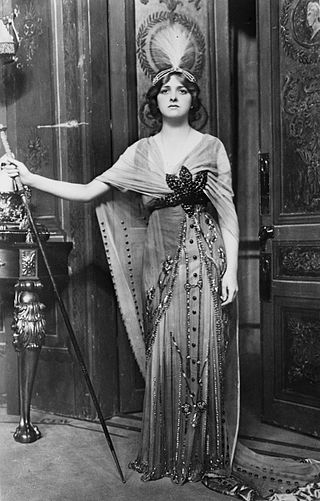
Dame Gladys Constance Cooper, was an English actress, theatrical manager and producer, whose career spanned seven decades on stage, in films and on television.

Dame Edith Mary Evans, was an English actress. She was best known for her work on the West End stage, but also appeared in films at the beginning and towards the end of her career. Between 1964 and 1968, she was nominated for three Academy Awards.

Mary Ellis was an American actress and singer who spent most of her career in Britain. Trained as a lyric soprano, she began performing at the Metropolitan Opera where she created the role of Genovieffa in the world premiere of Giacomo Puccini's Suor Angelica in 1918. In 1924 she originated the title role in Rudolf Friml's operetta Rose-Marie at Broadway's Imperial Theatre. Other Broadway parts included Shakespeare roles such as Kate in The Taming of the Shrew.

Virginia Lilian Emmeline Compton-Mackenzie,, known professionally as Fay Compton, was an English actress. She appeared in several films, and made many broadcasts, but was best known for her stage performances. She was known for her versatility, and appeared in Shakespeare, drawing room comedy, pantomime, modern drama, and classics such as Ibsen and Chekhov. In addition to performing in Britain, Compton appeared several times in the US, and toured Australia and New Zealand in a variety of stage plays.

Frederick Lonsdale was a British playwright known for his librettos to several successful musicals early in the 20th century, including King of Cadonia (1908), The Balkan Princess (1910), Betty (1915), The Maid of the Mountains (1917), Monsieur Beaucaire (1919) and Madame Pompadour (1923). He also wrote comedy plays, including The Last of Mrs. Cheyney (1925) and On Approval (1927) and the murder melodrama But for the Grace of God (1946). Some of his plays and musicals were made into films, and he also wrote a few screenplays.

Roland Young was an English-born actor. He began his acting career on the London stage, but later found success in America and received an Academy Award nomination for his role in the film Topper (1937).

Coral Edith Browne was an Australian-American stage and screen actress. Her extensive theatre credits included Broadway productions of Macbeth (1956), The Rehearsal (1963) and The Right Honourable Gentleman (1965). She won the 1984 BAFTA TV Award for Best Actress for the BBC TV film An Englishman Abroad (1983). Her film appearances included Auntie Mame (1958), The Killing of Sister George (1968), The Ruling Class (1972) and Dreamchild (1985). She was actor Vincent Price's third wife.

Nigel Dennis Patrick Wemyss-Gorman was an English actor and stage director born into a theatrical family.

Charles Henry Pywell Daniell was an English actor who had a long career in the United States on stage and in cinema. He came to prominence for his portrayal of villainous roles in films such as Camille (1936), The Great Dictator (1940), Holiday (1938) and The Sea Hawk (1940). Daniell was given few opportunities to play sympathetic or 'good guy' roles; an exception was his portrayal of Franz Liszt in the biographical film of Robert and Clara Schumann, Song of Love (1947). His name is sometimes spelled "Daniel".
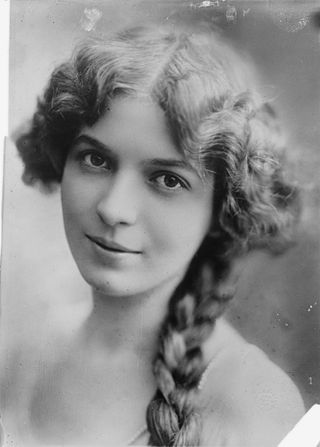
Ina Claire was an American stage and film actress.
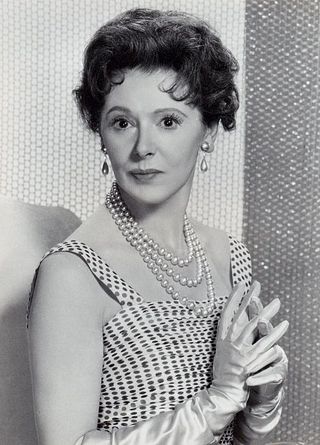
Isabel Jeans was an English stage and film actress known for her roles in several Alfred Hitchcock films and her portrayal of Aunt Alicia in the 1958 musical film Gigi.

Benita Hume was an English theatre and film actress. She appeared in more than 40 films from 1925 to 1955.

The Last of Mrs. Cheyney is a 1937 American comedy drama film adapted from the 1925 Frederick Lonsdale play The Last of Mrs. Cheyney. The film tells the story of a chic jewel thief in England, who falls in love with one of her marks.
The Last of Mrs. Cheyney may refer to:
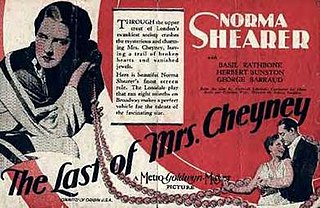
The Last of Mrs. Cheyney is a 1929 American Pre-Code comedy-drama film directed by Sidney Franklin. The screenplay by Hanns Kräly is based on the 1925 play of the same name by Frederick Lonsdale which ran on Broadway for 385 performances. The film was remade twice, with the same title in 1937 and as The Law and the Lady in 1951.
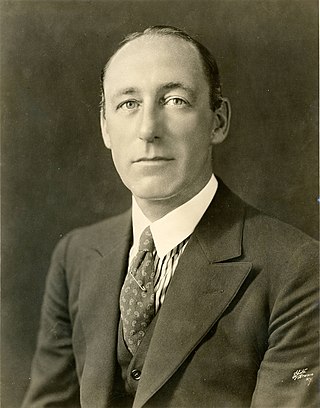
Francis Lumsden Hare was an Irish-born American film and theatre actor. He was also a theatre director and theatrical producer.

Mary Merrall, born Elsie Lloyd, was an English actress whose career of over 60 years encompassed stage, film and television work.

The Law and the Lady is a 1951 American comedy film directed by Edwin H. Knopf and starring Greer Garson, Michael Wilding and Fernando Lamas. It is not related to the Wilkie Collins novel The Law and the Lady. Very loosely based on the 1925 play The Last of Mrs. Cheyney by Frederick Lonsdale, the action is transferred to the turn of the century, the names are all changed, and the first half of the film shows the history of the two thieves. Previous film versions of the story, made in 1929, starring Norma Shearer, and 1937, starring Joan Crawford, retained the play's contemporary setting, included a crew of confederates, and opened with Mrs. Cheyney as an established figure in society. This film also ends differently from the play, with the partners in crime ending as romantic partners but going back to England to face the music for their very first swindle. In the play and in the two other films, Charles leaves and Mrs. Cheyney accepts Lord Dilling, who kisses her and declares: “That's the Last of Mrs. Cheyney!”
Monckton Hoffe (1880–1951) was an Irish playwright and screenwriter.

The Last of Mrs. Cheyney is a 1961 comedy film directed by Franz Josef Wild and starring Lilli Palmer, Carlos Thompson and Martin Held. The film was made as a co-production between France, Switzerland and West Germany. It is based on the 1925 play of the same title by the British writer Frederick Lonsdale which has been adapted into films on several occasions.